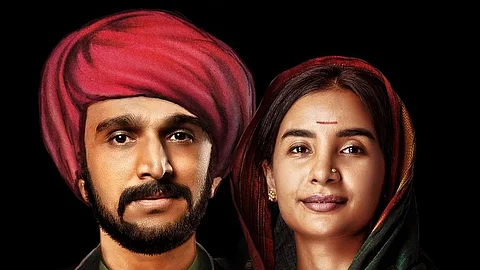

The release of Phule, a film portraying the revolutionary lives of Jyotirao and Savitribai Phule — 19th century reformers who dedicated their lives to fighting caste discrimination — has been postponed after it faced censorship demands from Brahmin groups, who claim the portrayal "promotes casteism."
The irony is difficult to miss: a historical account of two individuals who challenged caste hierarchy, opened India's first school for untouchable girls, and fought against Brahminical dominance is being contested by members of the very social group whose ancestors' privileges the Phules challenged.
Phule starring Pratik Gandhi and Patralekhaa, was scheduled to be released on April 11, coinciding with the birth anniversary of Mahatma Jyotirao Phule, is now expected to be released two weeks later, reports said.
The film’s release was stalled after Brahmin organisations like Akhil Bhartiya Brahmin Samaj, Brahmin Federation and Parshuram Aarthik Vikas Mahamandal opposed ironically claiming that the movie promotes casteism – the very same thing the Phule’s worked against.
Director Ananth Narayan Mahadevan, who himself is a Brahmin, said he received several letters objecting to the depiction of Brahmins in the film’s trailer.
The trailer shows how Jyotiba and Savitribai fought against caste discrimination and led a struggle to educate women from marginalised caste groups despite stiff opposition from the Brahmins. It also depicted Savitribai Phule being humiliated by hurling cow dung at her and Jyotirao Phule being assaulted for defying the caste hierarchy and challenging the upper castes.
"Many letters and notices have come from different Brahmin organisations. There was some misunderstanding after the trailer was launched. We want to clear those doubts so that there is no hassle in viewership,” the director told Mid-Day.
Mahadevan said that he had a dialogue with the opposing Brahmin groups attempting to clear their misconceptions following which they were reportedly content.
“I told them about how we’ve shown that (certain) Brahmins helped Jyotiba Phule set up 20 schools, and they were happy. When Phule opened the Satyashodhak Samaj, these Brahmins were the pillars. I’m a staunch Brahmin. Why will I (malign) my community? We have only shown the facts. It’s not an agenda film,” he said.
The Central Board of Film Certification (CBFC) has directed the makers of Phule to make several edits following the objections raised by Brahmin organisations. The edits include removing specific caste-related terms which is crucial for the film.
The CBFC has suggested a total of 10 changes such as replacing the visual of “man carrying broom” to “boys throwing cow dung at Savitribai” and modifying the dialogue of “3000 saal gulami (3000 years of slavery)” to “Kai saal puraani hain (this slavery is several years old).” The other changes include replacing the caste words Mang, Mahar, removing the voice-over about caste system and replacing the subtitle of caste to varna. The changes were suggested despite the makers submitting historical records to substantiate their claim.
Counter protests
Responding to the censorship of the CBFC and the protests by Brahmin groups, Prakash Ambedkar, president of Vanchit Bahujan Aaghadi party, gave a call for protest on April 11 at Phule Wada in Pune.
He demanded the CBFC to release the film without any cuts and also asked the government to make the film tax-free in Maharashtra.
“VBA follows the Phule-Shahu-Ambedkarwadi ideology and we will NOT tolerate and stay quiet to this insult of Mahatma Phule,” Prakash Ambedkar said.
Karnataka’s IT Minister Priyank Kharge also lambasted the Brahmin groups for stalling the film’s release. Terming Brahmins as the “architects of caste oppression”, he said they want to erase the history. “The architects of caste oppression now want to control even how their actions are remembered and spoken about? Those who institutionalized caste discrimination now seek to silence any mention of it.”